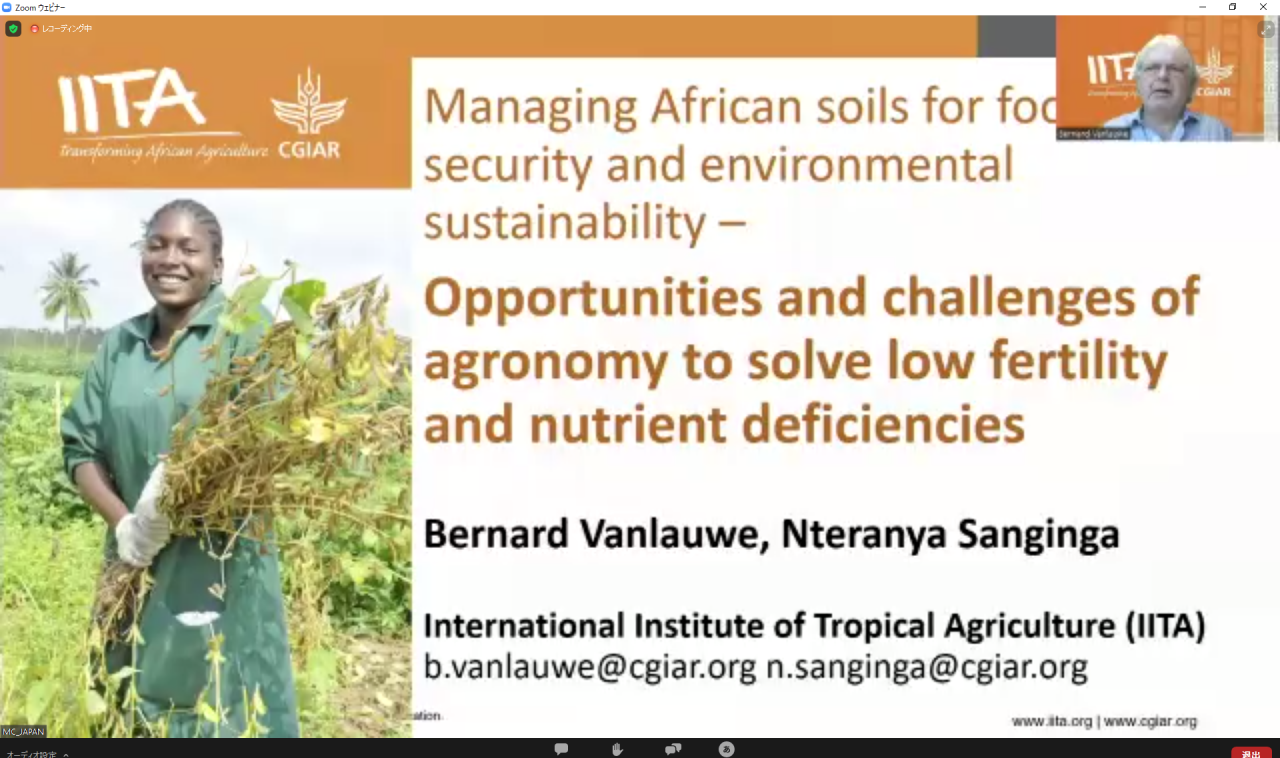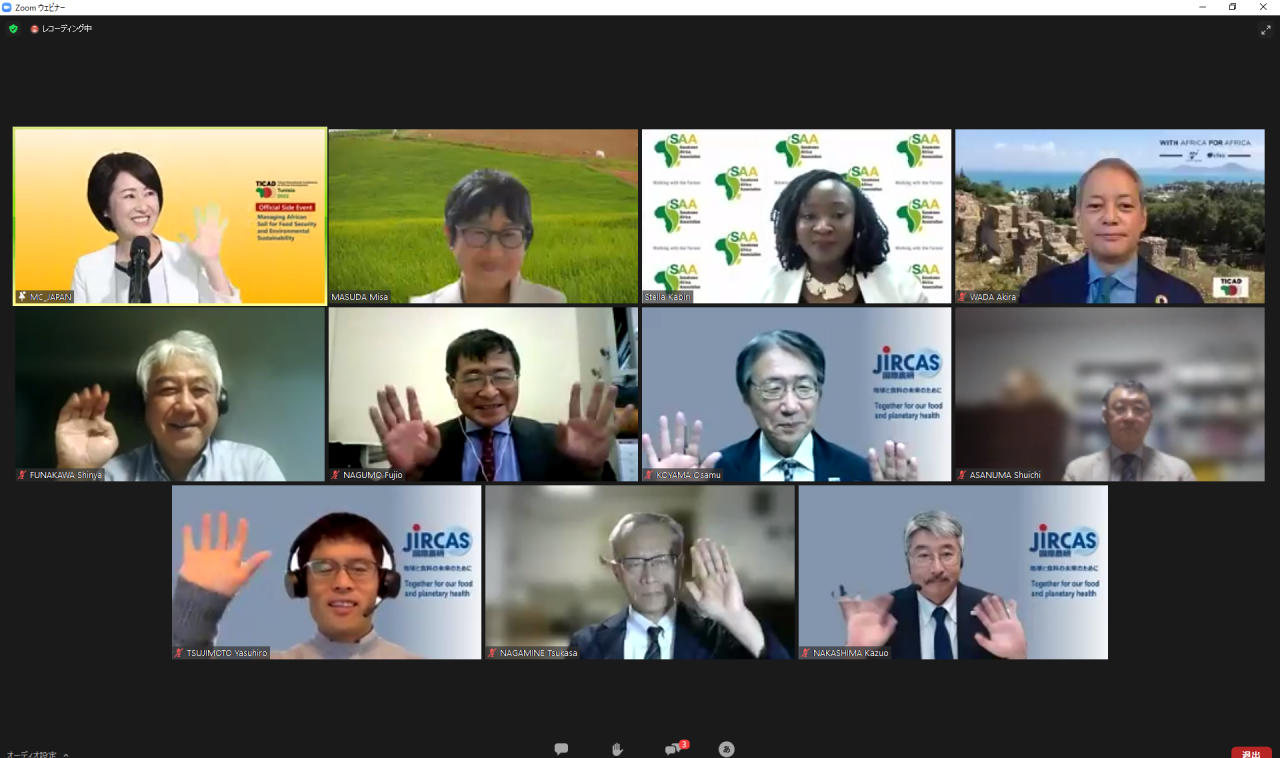An official side event of the 8th Tokyo International Conference on African Development (TICAD 8) entitled “Managing African Soil for Food Security and Environmental Sustainability” was organized by JIRCAS on August 30, 2022, with the support of the Japan Science and Technology Agency (JST) and the Japan International Cooperation Agency (JICA).
This event was attended by over 200 online participants members from Japan, Africa, and 17 other countries around the world, showing the high level of interest in African agronomy and soil fertility and oligotrophic soil management. We thank you very much for your participation.
We also appreciate your cooperation in filling out the questionnaire. We will use your comments and requests as much as possible for future events.
■ Program
https://www.jircas.go.jp/en/event/2022/e20220830
For those of you who were unable to attend the event, we have posted a video of the event on the JIRCAS YouTube channel. In the original language only, no Japanese-English interpretation is provided.
Part1: https://youtu.be/duyT3dT46e4
Part2: https://youtu.be/h-kIK1BverU
Part3: https://youtu.be/5Qtr-VJ0o6w
Part4: https://youtu.be/QuVWBpDfOug
■ Event Report
The purpose of this event was to share experiences and lessons learned for social implementation and to discuss them with input from private companies involved in fertilizer development and marketing in Africa and NGOs involved in training farmers. The purpose of the meeting was to share experiences and lessons learned for social implementation and to discuss the issues.
In his opening remarks, JIRCAS President KOYAMA Osamu, expressed his hope that this event would provide an opportunity for stakeholders to discuss how to make Africa's agricultural sector more resilient. In their welcoming remarks, Dr. NAGAMINE Tsukasa, former Vice-President of NARO and Research Supervisor of the Science and Technology Research Program for Global Partnerships (SATREPS), and Dr. ASANUMA Shuichi, (Special advisor, Economic Development Department, JICA), expressed their expectations for the dissemination of the results of SATREPS projects promoted by JIRCAS.
In the keynote lecture, Dr. Bernard Vanlauwe, R4D Director, Central Africa and Natural Resource Management, International Institute of Tropical Agriculture (IITA), gave a video presentation on Integrated Soil Fertility Management (ISFM) and future opportunities, which he has been working on in sub-Saharan Africa (SSA) for 20 years.
In Session 1, “Technology development to solve low fertility/nutrient bottlenecks”, Prof. FUNAKAWA Shinya of the Graduate School of Global Environmental Studies, Kyoto University, gave a lecture on adaptive agriculture in SSA's diverse soils. Then, Project Leader TSUJIMOTO Yasuhiro and Senior Researcher NAGUMO Fujio of JIRCAS presented major results of SATREPS Madagascar and SATREPS Burkina Faso, respectively, and their efforts toward dissemination.
In Session 2, "Social Implementation," Mr. WADA Akira, Director and General Manager of Africa Planning Department, Africa Division, Toyota Tsusho Corporation, presented a case study of activities to improve agricultural productivity in Kenya through fertilizer business, and Ms. Stella Kabiri, Leader of Sasakawa Africa Association (SAA) Ethiopia, gave a presentation on SAA's environmental and regenerative agriculture activities.
In the panel discussion, moderated by Dr. MASUDA Misa, Professor Emeritus of the University of Tsukuba and Research Supervisor of JST/SATREPS, the speakers discussed from different perspectives the challenges and solutions for the development of soil management technologies for the future of food in Africa and for the diffusion of soil management technologies to improve the livelihood of small farmers in Africa. Based on the discussions, the following three points were summarized as outputs.
- Examples of soil and manure management technologies that can both increase sustainable productivity and restore soil health to achieve truly sustainable food security were presented, and the need for further technological development was identified.
- There is no one-size-fits-all solution for both field and rice paddy, and it was confirmed that there is a need for soil and fertilizer management technologies and dissemination methods that are suited to local agro-climatic, soil, and socioeconomic conditions and that can be practiced by small-scale farmers.
- In order to develop them, it was confirmed that there is a need for collaborative cooperation among related organizations (research institutions, extension agencies, NGOs, companies, etc.) and for the development of human resources who will be responsible for the future of food in Africa.
In his closing remarks, Dr. NAKASHIMA Kazuo, Director of JIRCAS Food Program, referred to the TICAD 8 "Tunis Declaration" and stated the need for cooperation among related organizations and human resource development to realize sustainable development in Africa, and expressed his hope that this event would be an opportunity to promote future cooperation among related organizations.
For true food and nutrition security in Africa, JIRCAS will promote efforts to develop and disseminate soil fertility and oligotrophic soil management technologies in Africa in cooperation with related organizations. We hope that this event will serve as an opportunity to share our vision with national and international R&D partners, government agencies, private sector, NGOs, and others who value "soil health" in Africa, and to promote collaboration among related organizations to find solutions for resolving the low fertility and nutrient bottleneck in Africa. We strongly hope that by creating healthy soils that lead to improved health of people, stable and sustainable food security in Africa will be achieved.
- Q&A
- TICAD8sideEvent_20220830_Q&A.pdf480.67 KB


